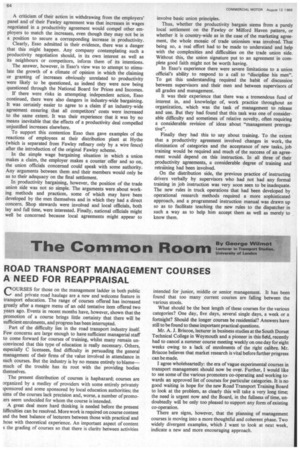ROAD TRANSPORT MANAGEMENT COURSES A NEED FOR REAPPRAISAL
Page 66

If you've noticed an error in this article please click here to report it so we can fix it.
COURSES for those on the management ladder in both public and private road haulage are a new and welcome feature in transport education. The range of courses offered has increased greatly after a meagre menu of an odd tentative item offered two years ago. Events in recent months have, however, shown that the promotion of a course brings little certainty that there will be sufficient enrolments, and progress has been interrupted.
Part of the difficulty lies in the road transport industry itself. Few concerns are large enough to have sufficient managerial staff to come forward for courses of training, whilst many remain unconvinced that this type of education is really necessary. Others, especially C licensees, find difficulty in persuading the general management of their firms of the value involved in attendance in such courses. But the industry is by no means entirely to blame— much of the trouble has its root with the providing bodies themselves.
The present distribution of courses is haphazard; courses are organized by a medley of providers with some entirely privately iponsored and some sponsored by local education authorities; the ifins of the courses lack precision and, worse, a number of promo.ers seem undecided for whom the course is intended.
A great deal more hard thinking is needed before the present lifficulties can be resolved. More work is required on course content ind the best balance of lecturers between those with practical and hose with theoretical experience. An important aspect of content s the grading of courses so that there is clarity between activities intended for junior, middle or senior management. It has been found that too many current courses are falling between the various stools.
What should be the best length of these courses for the various categories? One day, five days, several single days, a week or a fortnight? Should the longer courses be residential? Answers have still to be found to these important practical questions.
Mr. A. J. Briscoe, lecturer in business studies at the South Dorset Technical College in Weymouth and a pioneer in this field, recently had to cancel a summer course meeting weekly on one day for eight weeks owing to a lack of enrolments of the right calibre. Mr. Briscoe believes that market research is vital before further progress can be made.
I agree wholeheartedly: the era of vague experimental courses in transport management should now be over. Further, I would like to see some of the various promoters co-operating and working towards an approved list of courses for particular categories. It is no good waiting in hope for the new Road Transport Training Board to look at the problem, as clearly this will take a very long time; the need is urgent now and the Board, in the fullness of time, undoubtedly will be only too pleased to support any form of existing co-operation.
There are signs, however, that the planning of management courses is moving into a more thoughtful and coherent phase. Two widely divergent examples, which .1 want to look at next week, indicate a new and more encouraging approach.












































































































